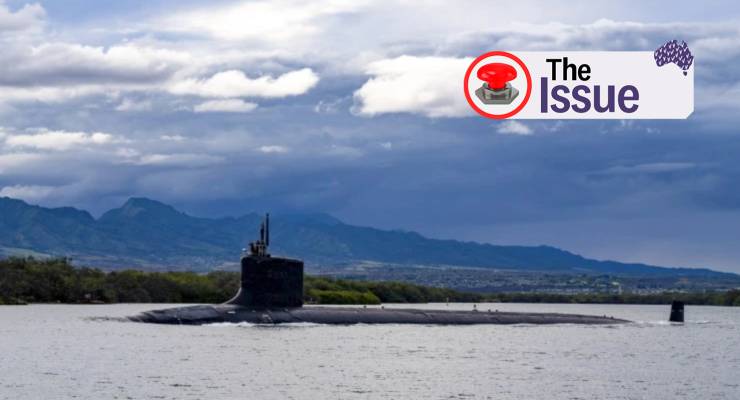
The Coalition has been desperate to turn this into a khaki election, painting Labor as weak on defence, China, national security, and all the other scaries out there in the world. Labor is determined to neutralise this attack by offering… much of the same.
Why does it matter?
Whoever is prime minister after May will have to deal with a more contested security environment in the region, the AUKUS pact, the diplomatic freeze with China, the fallout from Russia’s invasion of Ukraine, a potential second Trump administration in the United States… all big challenges.
What are the parties offering?
From the government, it’s mainly been to escalate attacks on the opposition for being soft on national security, with Defence Minister Peter Dutton launching numerous bad faith claims that Labor cut military spending during its last term in office.
The budget is a pretty good indicator of where the government stands: there’s a $38 billion plan to boost the size of the defence force and add 18,500 personnel by 2040, as well as REDSPICE (resilience, effects, defence, space, intelligence, cyber and enablers) — the $9.9 billion plan to beef up cyber-security.
Labor is largely in lockstep. It has backed AUKUS, increasing military spending, strengthening ties with QUAD countries, and escalating focus on cyber-security.
One slight area of difference is rhetorical. Labor has talked about viewing climate change as a national security issue, and claimed leadership on that front could boost Australia’s standing in the region. Labor has also pointed to more regional engagement.
Discussion
The difference between the two major parties on national security issues is largely political. Expect the government to continue its attacks, despite rebukes from the security agencies that manufacturing difference between the parties is unhelpful.
That said, an Albanese-Wong approach to the world may differ purely on vibes. At times, Dutton has ramped up the possibility of war over Taiwan, with a militaristic glee. Labor’s foreign affairs spokeswoman Penny Wong has attacked the defence minister for “amping up the prospect of war with a superpower”.
Labor has also talked about re-centring “diplomacy” in Australia’s foreign policy… whatever that means. And at a speech to the Australian National University’s National Security College last year, Wong discussed projecting our country’s multicultural face to the world, rather than retreating towards the Anglo-sphere or making jingoistic demands of Chinese Australians, as an important area of difference.
The point is that on the hard stuff, there’s little separating the Coalition and Labor. The opposition will stay tough on China and will continue to boost defence spending. The only real hint of difference is a promise to do it in a softer, less impulsive manner.








How Aussie politics works:
We go around the same loop endlessly. Our political system is a disaster.
a partial fix would be to ban the evil Murdoch media (all forms) outright, and deport all their ‘commentators’ to Nauru for an indefinite period without mobile phones…
This is a very apt description of politics in this country. It’s a race to the bottom with no sign of things changing for the better any time soon. Or ever.
It is not just Australia, but also the Pacific nations for whom climate change is a national security issue. Labor’s acknowledgement does at least mean a Labor government would be more receptive to accepting climate refugees from the flooding islands. There is also the possibility that Labor would equip our Armed Forces for significant disaster response capability, both here and in the maritime nations nearby.
Spending billions on gear to kill people is fiscally responsible. Spending billions on improving people’s lives is not.
It’s also remarkable how in the context of defence spending little or no attention is given to the potential security benefits of diplomacy and related foreign relations work. Does the government ever consider how a few billion spent on building good relationships with our neighbours might do far more for our security than the same money spent on more super-fancy weapons systems (which seem to be dysfunctional in direct proportion to their cost).I’m sure Australia needs a proper defence capability that meets its actual needs but when I hear ‘experts’ arguing that acquiring such systems allows Australia to ‘punch above its weight’ I despair. How can punching above our weight ever be good for us? What unnecessary fights do we want to provoke or get involved in?
As they used to say in pre-metric days – “An ounce of prevention is better than a pound of cure“.
As always bean counters end up burdening those who take their advice with greater costs.
The cessation of short wave, then finally cutting, of Radio Australia to the Pacific saved a paltry amount of money.
The loss to this country of so much goodwill, trust & influence far outweighed the “savings” and probably can never be retrieved, even with immense cost & effort
Absolutely. Trashing Radio Australia was a brilliant example of saving a little at an enormous cost.
Think of the jobs in manufacturing armaments and the subsequent demand for medical services afterwards – complementary and constantly increasing.
Should we regret that they are overseas? For the moment.